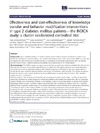Identificador persistente para citar o vincular este elemento:
https://accedacris.ulpgc.es/jspui/handle/10553/49721
| Título: | Effectiveness and cost-effectiveness of knowledge transfer and behavior modification interventions in type 2 diabetes mellitus patients-the INDICA study: A cluster randomized controlled trial | Autores/as: | Ramallo-Fariña, Yolanda García-Pérez, Lidia Castilla-Rodríguez, Iván Perestelo-Pérez, Lilisbeth Wägner, Ana María de Pablos-Velasco, Pedro Carrillo Domínguez, Armando Boronat Cortés, Mauro Vallejo Torres, Laura Estupiñán Ramírez, Marcos Pedrianes Martín, Pablo Benito García-Puente, Ignacio Salinero-Fort, Miguel Ángel Serrano-Aguilar, Pedro Guillermo Pérez de la Rosa, Abraham Figueroa, Águeda Caballero Guerra Pérez, Alejandro Pareja Ríos, Alicia carrillo, Alicia Pérez Sifre Perello, Andrés Gutiérrez Pérez, Ángela Trinidad Pérez Cejas, Antonia Pilar Cabrera de León, Antonio García Quintana, Antonio Herrera Domínguez, Bernardo Eusebio Sedeño Pérez, Carlos Martínez Alberto, Carlos Ramírez Álamo, Carlos Daranas Aguilar, Carmen Guerra Marrero, Carolina Lobos Soto, Cecilia Padrón Pérez, Cristina Sánchez Vega, Cristina Alvarado Marte, Dácil Hernández Obregón, Daniel de la Cruz Paz, Dionisio Hernández Correa, Dulce N. Espinosa Pozuelo, Elsa Florido Mayor, Elsa Pinilla Domínguez, Engracia Herrera García, Fátima Bonilla Aguiar, Félix Montón Álvarez, Fernando Cabrera López, Francisco Ferraz Jerónimo, José Francisco Hernández Díaz, Francisco Guerra de la Torre, Gloria Muelas Martín, Gregorio Monzón Monzón, Guillermo Rizo Arregui, Guillermo de la Rosa Merino, Héctor Gómez de Segura, Ignacio Llorente García Calcerrada, Isabel Álvarez Pérez, Jacqueline Aldunate Page, Jorge Federico García Dopico, José Antonio Alemán Sánchez, José Juan Salamanca Hernández, José Miguel Medina Santana, José Ramón Báez Hernández, Juan Andrés Pérez Valencia, Juan José Burgazzoli Samper, Juan Luis Wiebe, Julia Charlotte |
Clasificación UNESCO: | 32 Ciencias médicas | Palabras clave: | Decision-Support-Systems Life-Style Intervention Primary-Care Multifactorial Intervention Health-Professionals, et al. |
Fecha de publicación: | 2015 | Publicación seriada: | Implementation Science | Resumen: | Background: Type 2 diabetes mellitus is a chronic disease whose health outcomes are related to patients and healthcare professionals' decision-making. The Diabetes Intervention study in the Canary Islands (INDICA study) aims to evaluate the effectiveness and cost-effectiveness of educational interventions supported by new technology decision tools for type 2 diabetes patients and primary care professionals in the Canary Islands.Methods/design: The INDICA study is an open, community-based, multicenter, clinical controlled trial with random allocation by clusters to one of three interventions or to usual care. The setting is primary care where physicians and nurses are invited to participate. Patients with diabetes diagnosis, 18-65 years of age, and regular users of mobile phone were randomly selected. Patients with severe comorbidities were excluded. The clusters are primary healthcare practices with enough professionals and available places to provide the intervention. The calculated sample size was 2,300 patients.Patients in group 1 are receiving an educational group program of eight sessions every 3 months led by trained nurses and monitored by means of logs and a web-based platform and tailored semi-automated SMS for continuous support. Primary care professionals in group 2 are receiving a short educational program to update their diabetes knowledge, which includes a decision support tool embedded into the electronic clinical record and a monthly feedback report of patients' results. Group 3 is receiving a combination of the interventions for patients and professionals. The primary endpoint is the change in HbA1c in 2 years. Secondary endpoints are cardiovascular risk factors, macrovascular and microvascular diabetes complications, quality of life, psychological outcomes, diabetes knowledge, and healthcare utilization. Data is being collected from interviews, questionnaires, clinical examinations, and records. Generalized linear mixed models with repeated time measurements will be used to analyze changes in outcomes. The cost-effectiveness analysis, from the healthcare services perspective, involves direct medical costs per quality-adjusted life year gained and two periods, a 'within-trial' period and a lifetime Markov model. Deterministic and probabilistic sensitivity analyses are planned.Discussion: This ongoing trial aims to set up the implementation of evidence-based programs in the clinical setting for chronic patients. | URI: | https://accedacris.ulpgc.es/handle/10553/49721 | ISSN: | 1748-5908 | DOI: | 10.1186/s13012-015-0233-1 | Fuente: | Implementation Science [ISSN 1748-5908], v. 10 (47), (Abril 2015) |
| Colección: | Artículos |
Citas SCOPUSTM
15
actualizado el 08-jun-2025
Citas de WEB OF SCIENCETM
Citations
13
actualizado el 15-feb-2026
Visitas 5
369
actualizado el 15-ene-2026
Descargas
134
actualizado el 15-ene-2026
Google ScholarTM
Verifica
Altmetric
Comparte
Exporta metadatos
Los elementos en ULPGC accedaCRIS están protegidos por derechos de autor con todos los derechos reservados, a menos que se indique lo contrario.
